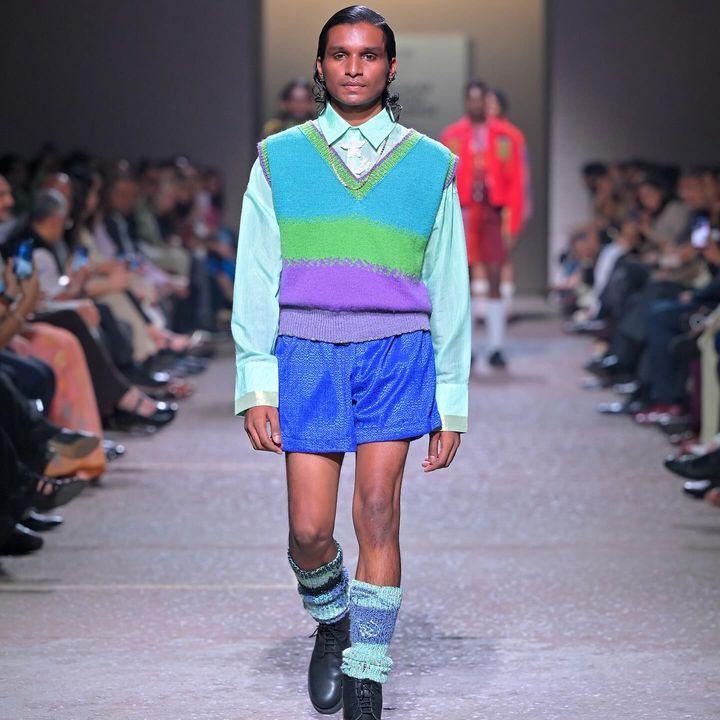The Circular Design Challenge is an innovative competition aimed at promoting sustainability and eco-conscious design.
Amesh Wijesekera is a British-Sri Lankan designer known for his commitment to sustainable fashion and circular design. His work is characterised by a blend of traditional craftsmanship and modern design, emphasising the importance of reusing materials and reducing waste in the fashion industry.
We had the opportunity to have a conversation when Amesh was in New Delhi for the finale of the CDC as the winner of the UK shortlist.

This interview was done after a mini trip to a famous flea market near his hotel; we almost weren't able to do the official interview due to lack of time considering we spent majority of it walking around the city and this all took place a day before the finale runway.
New Wave: Firstly, welcome to Delhi and congratulations on winning the UK Shortlist for CDC !
Amesh Wijesekera: Thank you, so excited to be here !
NW: So to start us off, did you create a special collection for CDC?
Amesh: Yes, this is my latest idea. It all started back in May when I had just one week to prepare for the London Jury. For CDC, we had a few weeks once we knew we were finalists. I'm presenting my brand new collection, which hasn't had a physical debut yet, only online. I added some extra pieces made in Sri Lanka, which arrived just now, making it a truly new collection.

NW: Was there a specific theme for this collection or were you expected to present a general one?
Amesh: My brand has a defined philosophy and themes, but they evolve with every season. It's always about highlighting local heritage crafts, like handloom, knitting, crochet, and incorporating materials from Sri Lanka's street markets. Initially, I didn't set out to be sustainable; I simply used what was around me, emphasising resourcefulness. However, now sustainability is a core aspect of the brand.
NW: That's interesting. Could you tell us more about how you're combining these elements?
Amesh: My goal is to bridge heritage crafts, like handloom, with contemporary international relevance. Sri Lanka is known for manufacturing, not design. I believe we can change that by integrating local talent and crafting a unique story. My approach involves working with artisans in villages, introducing them to new techniques, and applying these on contemporary silhouettes, making the craft more globally relevant.

NW: That's a noble initiative. How else does your brand relate to identity?
Amesh: The brand is also about reimagining South Asian beauty, gender, and sexuality, challenging stereotypes and obsessions like skin colour and gender norms. We're striving to empower people to express themselves freely. I believe that people should be able to experience all facets of life without constraints. For example, why should we assign gender to colours? We should embrace our individuality.
NW: Your perspective on colour and identity is intriguing.
Amesh: I think colour is universal and has different healing properties. It should not be confined by gender norms or stereotypes. Colour should empower, not limit us. My brand showcases everyday people who might not typically be considered beautiful. It's starting a movement where people are proud of their uniqueness, whether it's their skin or hair.

NW: That's incredibly empowering. Did you plan all of this from the start?
Amesh: No, these aspects of my brand evolved organically from my own experiences and struggles. They became a part of my work, reflecting the issues I couldn't openly discuss in society. I've embraced sustainability not as a trend, but as a way of life, mirroring how we've always lived in Sri Lanka, resourcefully using what's around us.
NW: Your approach aligns with the idea of 'jugaad' we have in India.
Amesh: Exactly, it is our way of life in Sri Lanka, using what's available and not subscribing to a throwaway culture. My goal is to make our cultural stories more accessible to the world. I want our craftsmanship to be recognized globally, and that's why I've recontextualized traditional elements into contemporary fashion.

NW: Can you explain the concept behind your collection?
Amesh: My collection focuses on prime, timeless statement pieces for a shared wardrobe concept. These are items meant to be versatile and worn throughout the year. I don't adhere to the typical fashion calendar. Instead, I prefer releasing smaller capsule collections, minimising strain on resources and emphasising the creative process over mass production.
NW: Is it safe to say that your approach to design is about quality over quantity?
Amesh: Absolutely. Quality, creativity, and sustainability are at the core of my brand. I aim to create a balance between art and fashion, making a positive impact.
NW: Thank you for doing this, hope the rest of your India trip is amazing!









![Eem Triplin Unpacks His Next Album, Tour Ambitions, Fashion, and the Inspirations Behind His Music [Interview]](https://static.wixstatic.com/media/781d42_ab0be2958027475688580bbb02a1ab1a~mv2.jpg/v1/fill/w_390,h_390,fp_0.50_0.50,q_90,enc_auto/781d42_ab0be2958027475688580bbb02a1ab1a~mv2.webp)










hinjewadi call girls
wakad call girls
ravet call girls
pimprichinchwad call girls
pimplesaudagar call girls
baner call girls
balewadi call girls
aundh call girls
shivaji nagar call girls
viman nagar call girls
koregaon park call girls
kharadi call girls
dhanori call girls
magarpatta call girls
kothrud call girls
zairalatha call girls